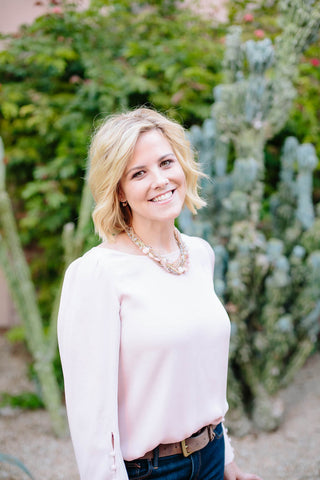Shopping Cart
If you're thinking of giving sleep training a try, you've probably already started scouring the web to find out exactly what sleep training is and how to do it. There are so many opinions on the topic that, like other new parents, you may be wondering when to begin, how difficult it is going to be, how long will it take or if sleep training is even the right choice for you and your baby.
To help you with some common questions, we have tried to break down sleep training with a professional - someone who's seen it all when it comes to baby sleep. We've also covered everything you need to know about sleep training in our Sleep Training Guide.
"Start teaching your baby early to fall asleep on their own. In a safe sleep space, lay a bassinet or crib with nothing in it. If there’s any loose bedding, toys, stuffed animals or bumpers, get rid of it." - Cara Dumaplin
Cara Dumaplin - neonatal nurse, mom of four, wife of a pediatrician, and founder of Taking Cara Babies is known as "The Baby Sleep Expert.” The hundreds of parents who have taken her popular classes and worked with her say she has certainly earned the title. Cara has worked with countless families, helping their babies to sleep better.
 |
Who's Cara?Cara- neonatal nurse, mom of 4, wife of a pediatrician, and founder of Taking Cara Babies- knows sleep deprivation is tough. Her mission: To help babies get the sleep they so desperately need so families can thrive. |
In our Q&A with Cara, we learned what sleep training really is, the benefits of sleep training, and a little about what it's like to work with a professional sleep consultant.
Q: LET'S START WITH THE OBVIOUS QUESTION - THERE'S A LOT OF INFORMATION OUT THERE, BUT A LOT OF IT IS CONTRADICTING AND/OR CONTROVERSIAL. SO, ACCORDING TO YOU AS A SLEEP TRAINING EXPERT...WHAT IS SLEEP TRAINING?
A: Oh Christina, the term “sleep training” causes so much controversy. Honestly, I tried to avoid the phrase altogether, but it’s so widely used as the term for “helping babies sleep.” So instead of shying away from it, I’ve decided to educate others as to why it brings such division and what my version of “sleep training” actually means.
To some, I think “sleep training” causes visions of babies left all alone screaming for hours on end while they starve in a cold room. For others, it causes a repulsed feeling as they envision a baby being “trained” much like one would train a dog. I can’t stand behind any of that!
Instead, my version of sleep training looks like helping babies learn to fall asleep and connect sleep cycles independently to create consolidated and restful nights and naps.
 |
Helping Parents Sleep AgainCara demonstrates the Zen Swaddle to expectant and new parents in her "Will I Ever Sleep Again?" newborn class. This class has become #1 in the nation as parents are learning how to lay a foundation for healthy sleep habits from the beginning. NO CRYING involved! |
Now, I’m not just putting fancy words on the same idea. Truly—this teaching can be done with parental reassurance and support while parents and babies remain emotionally attached. We are always responsive to babies hunger cues, and we believe night feedings should be gradually weaned when a baby is physically ready.
Q: SO HOW DO YOU KNOW ALL THIS IN THE FIRST PLACE?! WHAT GOT YOU STARTED, AND HOW HAVE YOU BECOME THE BABY SLEEP EXPERT?
A: Imagine a neonatal nurse and a pediatrician becoming parents, two professionals who have built a career out of caring for babies. You might assume the transition into parenthood would be quite simple. Well, I thought the same. After bringing my daughter home from the hospital I wondered, “How hard can this be? We know babies!”
Fast forward 8 months later, and this beautiful baby girl was awake and nursing every 45 minutes ALL NIGHT LONG, and this was our only way to get her to sleep. Honestly, mama, daddy, and sweet baby were all a HOT MESS. Ella didn’t nap, only ate well at night, and was constantly overtired. I was exhausted, overwhelmed, and sad. Sleep deprivation was robbing me of being the mother I longed to be for Ella. Even though we were well-trained and experienced “baby professionals,” nighttime was still a nightmare. This led me on a journey to truly understand infant sleep.
Through hours and hours of research, we did get Ella sleeping through the night! And in her own crib! I can honestly say sleep changed our lives: I stopped dreading our nights. During the day, she began napping, and she actually ate well too. Sleep for everyone helped us to reclaim joy for our family.
Over the years, I became known as “The Baby Sleep Expert” among our friends as I learned more and more of the science behind baby sleep. With the knowledge and research I had gained, I saw that I could make a difference for exhausted parents and babies! And that’s how “Taking Cara Babies” was BORN.
Q: SO NOW THAT WE KNOW WHAT SLEEP TRAINING IS AND THAT IT'S NOT TO BE FEARED, CAN YOU EXPLAIN WHAT THE BENEFITS OF SLEEP TRAINING ARE?
A: The benefits of sleep training are really the benefits of good sleep! Just take a second to think about how solid, restful sleep impacts your life, even as an adult. Sleep is so necessary!!
Here’s what we know about that same sleep benefit with babies:
-
Babies who sleep more at night have a more pleasant temperament - they’re more approachable, less distractible, and more adaptable.
-
Sleep is scientifically proven as necessary for infants’ brains to mature and for memories to be consolidated.
-
Small but constant deficits in sleep over time tend to have escalating and often long-term effects on brain function.
-
Healthy sleep positively affects neurological development and appears to be the right medicine for the prevention of many learning and behavioral problems.
-
Infant sleep problems have a direct impact on maternal depression.
-
Infants with depressed mothers have higher levels of the stress hormone, cortisol. Studies confirm that when an infant’s sleep improves, so does the mother’s mental health. Maternal depression decreases; maternal anxiety lowers; and marital difficulty mends. (See resources below).
With these scientific findings, the importance of helping a baby achieve consolidated sleep is so clear.
Zen Sleepwear™: Helping your baby sleep better and
|
Q: IS THERE AN "IDEAL" AGE TO START SLEEP TRAINING?
A: I teach parents how to create a strong sleep foundation starting at 4 weeks of age. I have a newborn class called “Will I Ever Sleep Again.” New and expectant parents describe the class as “life changing” because it helps them to set up healthy habits from the beginning with NO CRYING involved. Many have babies sleeping 8- 12 hours by 8-12 weeks. You can learn more about that class HERE.
For parents who find Taking Cara Babies while facing the 4-month sleep regression, we have a 50-page digital download to help parents traverse this tricky developmental stage. “Navigating Months 3 & 4” helps face this regression with a plan to help achieve more restful nights.
For those with babies over 5 months of age, “The ABC’s of Sleep” is the online class to teach parents how to create a customized sleep plan for their little ones. It is a 14-night plan to help babies conquer rough nights and achieve 10-12 hours of consolidated night sleep each night. This class is “official sleep training.” Please note this plan allows for night feedings to be gradually weaned or even maintained if needed. Some babies may still require a night feeding for proper growth.
OPTIONS FOR EVERY PARENT Taking Cara Babies' newborn sleep class is taught live in Scottsdale, AZ and sells out to a full house at each and every class. Parents across the globe are learning Cara's techniques as this class can also be watched online. |
So to recap-- you can begin “sleep learning” starting at 4 weeks of age. Resources are available for a baby of any age, but I prefer waiting until 5 months of age before starting any “formal sleep training.” Of course, we need approval from your pediatrician, and your baby needs to be clear of any medical issues that can cause pain or discomfort.
Q: I THINK A LOT OF PARENTS THINK THAT THEIR BABY WILL JUST GROW OUT OF BEING A "BAD" SLEEPER...HOW DO PARENTS KNOW IF THEIR CHILD NEEDS SLEEP TRAINING?
A: Sleep is a learned skill. Biologically, our bodies need it and require it, but the ability to fall asleep and connect sleep cycles independently is a learned skill. If a baby is consistently cranky and overtired, it’s probably time to help your baby become a better sleeper. If you are not thriving as a parent because being up all night with your baby is causing sleep deprivation, it’s probably time to do something. I walked this same path and know how hard chronic sleep loss can be on a family. You can watch my story HERE.
Q: WHAT SHOULD PARENTS CONSIDER OR ASK THEMSELVES BEFORE STARTING SLEEP TRAINING?
A: If you have a newborn, I highly recommend taking the newborn sleep class. This class involves NO CRYING, is breastfeeding friendly, and is developmentally appropriate for babies from birth to 12 weeks of age. This is all about laying that foundation rather than formal sleep training.
Prior to beginning any formal sleep training, parents should have clearance from their pediatricians. All medical problems need to be resolved, and your baby must be pain free. You should ask yourself if you are ready to set aside 90 minutes to learn all about a sleep plan. You also need to decide if you are ready to whole-heartedly commit to the process and follow a plan consistently for 14-28 days.
Q: THERE ARE SO MANY METHODS OF SLEEP TRAINING OUT THERE, AND MANY SLEEP COACHES AND SLEEP CONSULTANTS TOO...HOW DO PARENTS KNOW WHICH SLEEP TRAINING METHOD AND CONSULTANT IS RIGHT FOR THEM AND THEIR FAMILY?
A: Do your research!
Does the person who is helping you use science-based methods? Do they allow you to offer support and reassurance to your little one throughout the entire process? Do they allow night feedings to be gradually weaned instead of abruptly halted? Do they allow you to customize any plan for your specific baby? Do they offer support for your baby’s specific situation? Have they worked with thousands of babies before yours?*
If the answer is yes, you are in the right place. Trust your gut too. You know YOUR baby better than any other human on the planet.
THE SUPPORT YOU NEED Cara and the Taking Cara Babies Team are comprised of moms and sleep consultants who are also teachers, infant developmental specialists, and nurses who love to support families on their journey to more restful nights. |
*Taking Cara Babies courses and resources can answer “yes” to all of these questions.
Q: WHAT METHOD(S) OF SLEEP TRAINING DO YOU USE AT TAKING CARA BABIES? WHAT MAKES TAKING CARA BABIES DIFFERENT?
A: At Taking Cara Babies, we use an approach that meets each baby where he or she is developmentally. If you come to us with a baby who is under 12 weeks of age, our approach does not involve any crying. During the 3-4 month age, we will show you how to approach your little one with hands on support and very gradually and gently nudge them toward more consolidated night sleep.
For babies over 5 months of age, we use intermittent, hands-on reassurance while gradually weaning night feedings. Although there is crying involved at this age, our goal is for your baby to shed the least number of tears possible. We always want to provide a loving, emotionally stable, science-backed approach to learning consolidated sleep.
Taking Cara Babies believes that parents are the most important part of teaching and loving a baby. So our courses and resources equip them with the tools to teach their little ones while supporting them with the personalized guidance and support that they need along the way.
When you use Taking Cara Babies, you can trust that you are learning from a health care professional with the heart of a mama. I have walked in the shoes of parents. I have faced and conquered sleep deprivation. I have found the solution to restful nights so parents can reclaim the joy of parenthood.
Q: If a parent is interested in sleep training or taking one of your Taking Cara Babies courses, are there any products you use and would recommend parents to try?
A: For all babies, I highly recommend a sound machine. The Rohm is my current favorite. Blackout shades can also be really helpful because a tiny shift in light can cause early morning wakings - these are a very affordable option. For a newborn, I encourage a swaddle that either velcros or zips. The Zen Swaddle is a fabulous choice. For babies who are rolling, I absolutely LOVE the Nested Bean Zen Sack. Both the swaddle and sleep sack become a cue for your little one's brain that sleep is coming. It's a perfect part of any nap or bedtime routine.
 |
I recommend the Zen Swaddle or Sack!Taking Cara Babies has online courses that teach parents how to help their little ones sleep. Cara says the Nested Bean Zen Sack can be a helpful tool to cue your little one's brain that sleep is coming. |
Q: FOR THE PARENTS WHO THINK SLEEP TRAINING IS RIGHT FOR THEIR BABY, HOW/WHERE SHOULD THEY START?
A: At Taking Cara Babies, it starts by visiting the website www.TakingCaraBabies.com and selecting your baby’s age. Simply watch and read the appropriate course/resource to begin the process to better nights.
I will show you every step of the way.
Make sure you follow Cara on Instagram and Facebook for more from Taking Cara Babies!
We hope that you got the answers you were looking for in this Q&A with Cara. If you're interested in learning more about her services and courses, hop on over to her website: www.takingcarababies.com. We highly recommend it!
References
Mindell, J.A., B. Kuhn, D.S. Lewin, L.J. Meltzer, and A. Sadeh. Behavioral treatment of bedtime problems and night wakings in infants and young children. Sleep. 29(10): p. 1263-76. 2006.
Scher, A. Infant sleep at 10 months of age as a window to cognitive development. Early Hum Dev. 81(3): p. 289-92. 2005.
Tarullo, A.R., P.D. Balsam, and W.P. Fifer. Sleep and Infant Learning. Infant Child Dev. 20(1): p. 35-46. 2011.
Spruyt, K., R.J. Aitken, K. So, M. Charlton, T.M. Adamson, and R.S. Horne. Relationship between sleep/wake patterns, temperament and overall development in term infants over the first year of life. Early Hum Dev. 84(5): p. 289-96. 2008.
Taveras, E.M., S.L. Rifas-Shiman, E. Oken, E.P. Gunderson, and M.W. Gillman. Short sleep duration in infancy and risk of childhood overweight. Arch Pediatr Adolesc Med. 162(4): p. 305-11. 2008.
Ross, C.N. and K.H. Karraker. Effects of fatigue on infant emotional reactivity and regulation. Infant Mental Health Journal. 20(4): p. 410-428. 1999.
Gomez, R.L., R.R. Bootzin, and L. Nadel. Naps promote abstraction in language-learning infants. Psychol Sci. 17(8): p. 670-4. 2006.
Tikotzky, L., D.E.M. G, J. Har-Toov, S. Dollberg, Y. Bar-Haim, and A. Sadeh. Sleep and physical growth in infants during the first 6 months. J Sleep Res. 19(1 Pt 1): p. 103-10. 2010.
Hupbach, A., R.L. Gomez, R.R. Bootzin, and L. Nadel. Nap-dependent learning in infants. Dev Sci. 12(6): p. 1007-12. 2009.
Bayer, J.K., H. Hiscock, A. Hampton, and M. Wake. Sleep problems in young infants and maternal mental and physical health. J Paediatr Child Health. 43(1-2): p. 66-73. 2007.
Wake, M., E. Morton-Allen, Z. Poulakis, H. Hiscock, S. Gallagher, and F. Oberklaid. Prevalence, stability, and outcomes of cry-fuss and sleep problems in the first 2 years of life: prospective communitybased study. Pediatrics. 117(3): p. 836-42. 2006.
Hiscock, H., J. Bayer, L. Gold, A. Hampton, O.C. Ukoumunne, and M. Wake. Improving infant sleep and maternal mental health: a cluster randomised trial. Arch Dis Child. 92(11): p. 952-8. 2007.
Martin, J., H. Hiscock, P. Hardy, B. Davey, and M. Wake. Adverse associations of infant and child sleep problems and parent health: an Australian population study. Pediatrics. 119(5): p. 947-55. 2007.
Hiscock, H. and M. Wake. Randomised controlled trial of behavioural infant sleep intervention to improve infant sleep and maternal mood. BMJ. 324(7345): p. 1062-5. 2002.
Murray, L. and P. Cooper. Effects of postnatal depression on infant development. Arch Dis Child. 77(2): p. 99-101. 1997.
Martins, C. and E.A. Gaffan. Effects of early maternal depression on patterns of infant-mother attachment: a meta-analytic investigation. J Child Psychol Psychiatry. 41(6): p. 737-46. 2000.
Mindell, J.A., A. Sadeh, B. Wiegand, T.H. How, and D.Y. Goh. Cross-cultural differences in infant and toddler sleep. Sleep Med. 11(3): p. 274-80. 2010.
Murray, L., A. Arteche, P. Fearon, S. Halligan, I. Goodyer, and P. Cooper. Maternal postnatal depression and the development of depression in offspring up to 16 years of age. J Am Acad Child Adolesc Psychiatry. 50(5): p. 460-70. 2011.
Essex, M.J., M.H. Klein, E. Cho, and N.H. Kalin. Maternal stress beginning in infancy may sensitize children to later stress exposure: effects on cortisol and behavior. Biol Psychiatry. 52(8): p. 776-84. 2002.
Connor, J., R. Norton, S. Ameratunga, E. Robinson, I. Civil, R. Dunn, J. Bailey, and R. Jackson. Driver sleepiness and risk of serious injury to car occupants: population based case control study. BMJ. 324(7346): p. 1125. 2002.
Other Sleep Training Resources
Zerotothree.Org: Getting Baby to Sleep
Healthychildren.Org: Healthy Sleep Habits
You Might Also Like:

